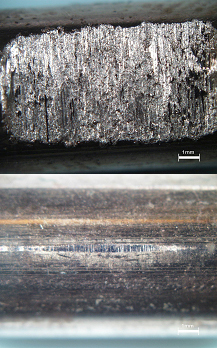Tribology
Our research focuses on the investigation of the adsorbed additive
films and the changes in these films after tribological stress. We
use a special extension of our electron spectrometer to adsorb the
additives from their solutions. In order to avoid polluting the
samples after adsorption the adsorption cell, which is usually used
as electrochemical cell, is directly
plugged to the UHV spectrometer and kept under noble gas atmosphere
during the experiments.The adsorbed films were studied by angle
resolved ESCA, which provides information about the depth
distribution of the various chemical compounds forming the
film.
In order to look at the changes of the molecules adsorbed we
perform tribologic testing at AC2T. There we use a tribometer with a
special fluid cell where we use the sample holders for the electron
spectrometer as support for the tribological pairings. Therefore
further preparation of the tribological samples like cutting etc.,
which is likely to pollute the samples, is prohibited. The samples
were transferred in their solutions to the electron spectrometer
and investigated. From the tribologic tests we can calculate
important parameters like the coefficient of friction and the total
wear volume for the various additives and tribological pairings.
Images from copper tribological pairings using two different hydroxyquinoline isomeres as addditiv showing the different tribological behaviour.

The ambient AFM provides the possibility to research the interaction between the additives and the surface on the nanoscopic scale. We can research the tribologic behaviour of the various tribological pairings under liquids in a special fluid cell. In these experiments we determine the topography of the samples, the coefficient of friction at the nano scale and record force distance curves. Furthermore we are able to change the composition of the liquids or the concentration of the additives by using a flow through equipment with the fluid cell.
